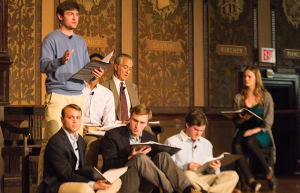
Academy award nominee David Strathairn acted as Jan Karski alongside an ensemble of students in a staged reading of “Remember This: Walking with Karski” in Gaston Hall on Thursday evening.
The university celebrated the centenary anniversary of the birth of Jan Karski, a late Georgetown professor and a member of the Polish World War II resistance, on Thursday afternoon with a panel discussion, “Responsibility to Protect,” and a staged reading, “Remember This: Walking with Karski.”
In 1942 and 1943, Karski alerted the Polish, British and American governments about the circumstances in German-occupied Poland, including the presence of concentration camps and the destruction of the Warsaw Ghetto. Karski later taught Eastern European affairs and international affairs in the School of Foreign Service for 40 years.
Director of the Master of Science in Foreign Service Anthony Arend (SFS ’80), Security Studies Program Director of Teaching Robert Egnell and Ambassador Melanne Verveer, the director of the Institute for Women, Peace and Security, spoke on the panel in Lohrfink Auditorium about Karski’s work and the “responsibility to protect” in cases of crimes against humanity. School of Foreign Service Acting Dean James Reardon-Anderson introduced the panel, and said that Karski’s work set the foundation for the modern conception of foreign relations.
“In many ways, Jan Karski was the pioneer of the principal that is now so much tested in international affairs. We framed this panel and decided to bring Karski up to the 21st century and look at the implications of his work today,” Anderson said.
In his address, Egnell spoke about the meaning of Karski’s concept of the responsibility to protect and its place in the political sphere.
“The responsibility to protect is a new norm that seeks to address the international community’s failure to prevent genocide, war crimes, ethnic cleansing and crimes against humanity. … These ideas aren’t going anywhere,” Egnell said. “However, in order to understand the promises and limitations of the responsibility to protect, we really need to place it in a political context.”
Egnell also pointed out the contradictions present within the concept of the responsibility to protect.
“We simply cannot protect individual sovereignty and human rights without at the same time honoring the principle of state sovereignty, and that is a contradiction we live with and is at the heart of responsibility to protect concepts as well,” Egnell said.
Despite its flaws, though, Egnell said that the idea represents a shift in modern international affairs.
“While it might be seen as dysfunctional, it’s just a reflection of international politics and the different agenda that really define international states and peoples in the modern age,” Egnell said. “It represents ambition and normative direction in world affairs. And that is a much longer trend away from absolute interpretations and state sovereignty and towards respect to human rights and sovereignty as a responsibility.”
Verveer said that the idea of the responsibility to protect has evolved over the years, transforming towards humanitarianism.
“The words ‘the right to intervene’ slowly morphed into the responsibility to protect,” Verveer said. “It turned that issue of intervention for humanitarian purpose into responsibility to protect human lives, a responsibility of the international community to do so.”
Verveer also spoke about sexual violence against women and its implications in war and genocide.
“The obligation to protect is definitely an obligation to protect women against sexual violence, and the obligation to prevent and the obligation to rebuild certainly cannot succeed without understanding the role that women have to play in conflict resolution, in reconstruction, in peace negotiations,” she said.
Additionally, Arend spoke about the benefits, setbacks and challenges to the responsibility to protect. To Arend, the primary benefit of the concept is that it helped alter the definition of sovereignty to hold states accountable for its internal affairs.
“Sovereignty doesn’t mean you can do whatever you want because you’re a state. Rather, it means to be a state, you have the responsibility to protect people in your state, not just nationals, but aliens, refugees, anyone who happens to be in your state,” Arend said. “If they’re in your state, you have to protect them from crimes against humanity, from genocide, from other forms of mass atrocities.”
In order to increase the effectiveness of the responsibility to protect, Arend said that states must alter their conceptions of it and extend it to regional organizations. States do not have the legal right to intervene, since the United Nations Charter of 2009 does not create any new international law, but Arend said that there are ways around this problem.
“What I’m suggesting is that important states in the international system need to work with regional organizations to come up with new norms when intervention can take place to end these mass atrocities,” Arend said.
Sinéad Carolan (SFS ’17) attended the event and said that it helped her better understand crimes against humanity and the effect of the Holocaust.
“I came because I learned about Jan Karski and the fact that he was a professor at Georgetown in my Eastern European history class last semester, and I’m really interested in Europe and the Holocaust, as well as learning about the way we look at the Holocaust in history and how that applies to current events,” Carolan said.
Kiki Shim (SFS ’17) said that the panel gave her a better idea of threats to human rights in war.
“I think I’ve always been oddly, morbidly fascinated with the Holocaust and what its implications are in terms of morality,” Shim said. “This panel was very illuminating in terms of telling us more about different policies, especially the right to protect, because I’m interested in global human rights.”
“Remember This: Walking with Karksi,” directed by Davis Performing Arts Center Artistic Director Derek Goldman, had its world premiere at Gaston Hall. Academy Award nominee David Strathairn featured as the titular figure in the reading, which chronicle Karski’s life.




















